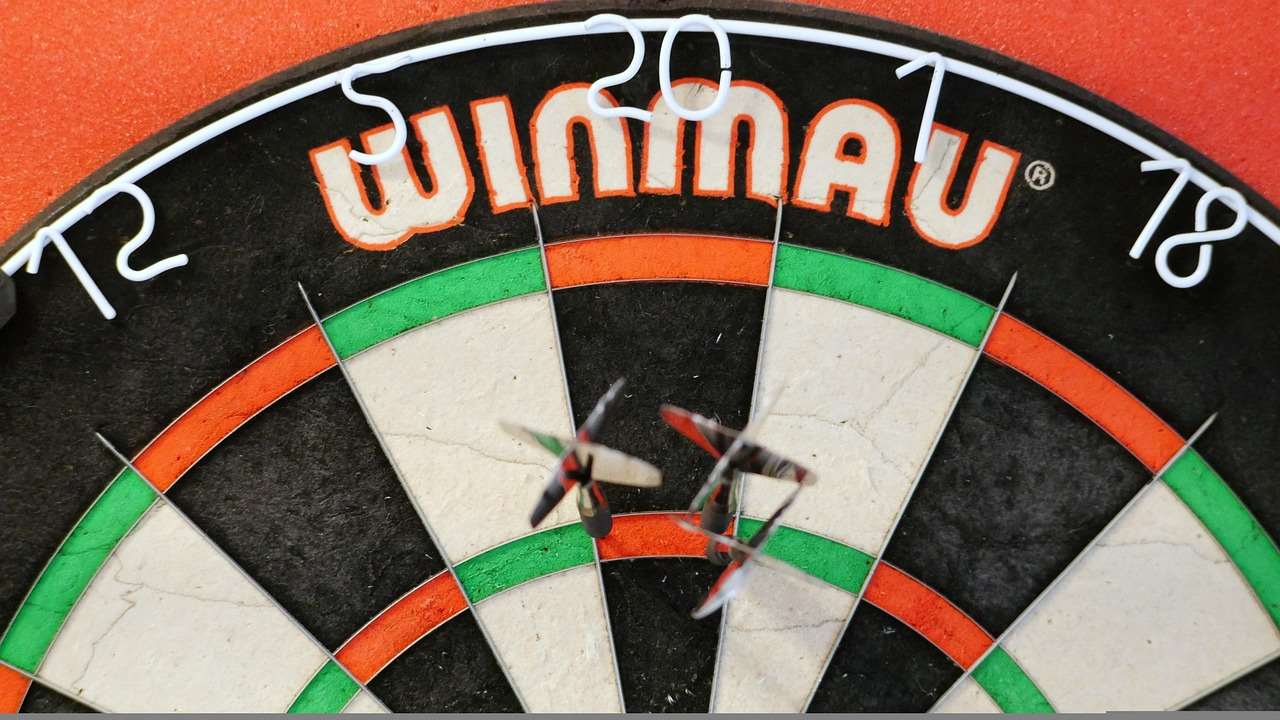The key to enjoying darts in a recreational setting lies in **the importance of flexible dart rules for recreational play**: adapting the game to suit the skill levels and preferences of all participants ensures everyone has fun. This article explores how modifying standard dart rules can enhance the recreational experience, covering everything from handicap systems to completely new game variations.
⚠️ Still Using Pen & Paper (or a Chalkboard)?! ⚠️
Step into the future! The Dart Counter App handles all the scoring, suggests checkouts, and tracks your stats automatically. It's easier than you think!
Try the Smart Dart Counter App FREE!Ready for an upgrade? Click above!
Why Flexible Rules Matter in Recreational Darts
Traditional dart rules, while providing a solid framework for competitive play, can sometimes be a barrier to enjoyment for casual players. The pressure to score high, the complexity of some games, and the skill gap between players can all contribute to a less-than-ideal experience. This is where **the importance of flexible dart rules for recreational play** really shines through. Embracing adaptability opens up the game to a wider audience, making it more accessible and inclusive.
Consider a scenario where a group of friends, with varying degrees of darting experience, gather for a casual game. Sticking rigidly to the standard 501 format might quickly become frustrating for the less skilled players. However, by implementing minor adjustments – such as allowing players to start with a higher score or introducing a handicap system – the game becomes significantly more balanced and enjoyable for everyone involved. This also makes the game more accessible for beginners, helping them learn and improve without feeling overwhelmed. You can also simplify the rules using information available in Simplified 501 game rules for novice players.

Benefits of Adapting Dart Rules
- Increased Engagement: When everyone feels like they have a chance to win, they’re more likely to stay engaged and participate.
- Reduced Frustration: Modified rules can level the playing field, minimizing the frustration for less experienced players.
- Improved Learning: A relaxed and enjoyable environment is conducive to learning and improvement.
- Greater Social Interaction: Flexible rules often encourage more interaction and camaraderie among players.
- More Fun: Ultimately, the goal is to have fun, and adaptable rules are key to achieving this.
Handicap Systems: Leveling the Playing Field
One of the most effective ways to embrace **the importance of flexible dart rules for recreational play** is through the implementation of handicap systems. These systems aim to equalize the playing field by giving less skilled players an advantage, allowing them to compete more effectively against more experienced opponents. There are various approaches to implementing handicaps in darts.
One common method is to award extra points to the weaker player(s) at the start of the game. For example, in a game of 501, a less experienced player might start with 551 or 601 points. This provides them with a head start and makes it more challenging for the stronger player to catch up. You can adjust the handicap based on the relative skill levels of the players involved.
Another approach involves allowing weaker players to have more attempts at hitting doubles or specific targets. For example, a less experienced player might be given three attempts to hit a double to finish, while a more experienced player only gets one. This can significantly improve their chances of winning, making the game more exciting for everyone.
Handicap systems aren’t just about making the game fairer; they also add an element of strategic thinking. Stronger players need to adjust their gameplay to account for the handicap, while weaker players can gain confidence and develop their skills.
Creative Dart Game Variations for Recreational Play
Beyond handicap systems, exploring different game variations is another excellent way to highlight **the importance of flexible dart rules for recreational play**. Standard games like 501 and Cricket can become repetitive, especially for casual players. Introducing new and creative games can inject fresh excitement and cater to diverse skill levels. It is important to consult resources that discuss fun dart game variations with modified rules for inspiration.
Here are a few examples of engaging dart game variations:
- Around the Clock: Players must hit each number on the dartboard in sequence, starting with 1 and progressing to 20. The first player to successfully hit all numbers wins.
- Killer: Each player selects a number on the dartboard. Players then take turns trying to hit their own number three times to become a “killer.” Once a player is a killer, they can aim at other players’ numbers to eliminate them. The last player standing wins.
- Golf: Each round represents a “hole.” Players aim for a specific target on the board, and their score for that round is the number of darts it takes to hit the target. The player with the lowest score after nine or eighteen rounds wins.

These are just a few examples, and the possibilities are endless. Feel free to adapt existing games or create your own variations to suit your group’s preferences and skill levels. The key is to prioritize fun and engagement above strict adherence to traditional rules. Many people find enjoyment in Alternative darts rules for home play.
Adapting Dart Rules for Different Skill Levels and Ages
**The importance of flexible dart rules for recreational play** is amplified when considering the diverse skill levels and ages of players. What works for a group of experienced adults may not be suitable for children or beginners. Adapting the rules to accommodate these differences is crucial for ensuring everyone has a positive experience.
For Beginners:
- Shorter Throwing Distance: Allow beginners to stand closer to the dartboard to improve their accuracy.
- Larger Target Areas: Focus on hitting larger sections of the board initially, rather than specific numbers or doubles.
- Simplified Scoring: Use a simplified scoring system, such as counting only the total score of each throw, rather than requiring specific checkouts.
For Children:
- Safety First: Emphasize safety rules and ensure children are properly supervised.
- Soft-Tip Darts: Use soft-tip darts to minimize the risk of injury.
- Team Play: Encourage team play to promote cooperation and support.
For Mixed-Level Groups:
- Handicap Systems: Implement handicap systems to level the playing field.
- Rotating Partners: Rotate partners frequently to allow players of different skill levels to learn from each other.
- Choose Inclusive Games: Select games that are easy to understand and participate in, regardless of skill level.

Remember, the goal is to create a fun and welcoming environment for everyone. By adapting the rules to suit the specific needs of your group, you can ensure that everyone feels included and has a positive experience. Consider also Adapting darts rules for beginners to ease the learning curve.
Creating a Fun and Inclusive Darting Environment
Beyond adapting the rules, creating a positive and inclusive environment is essential for maximizing enjoyment in recreational darts. This involves fostering a sense of camaraderie, encouraging sportsmanship, and minimizing pressure.
Here are some tips for creating a fun and inclusive darting environment:
- Encourage Positive Reinforcement: Offer encouragement and praise for good throws, regardless of skill level.
- Focus on Fun, Not Perfection: Remind players that the primary goal is to have fun, not to achieve perfect scores.
- Minimize Competition: Emphasize team play and cooperation over individual competition.
- Celebrate Successes: Acknowledge and celebrate successes, both big and small.
- Be Respectful: Treat all players with respect, regardless of their skill level.

By fostering a supportive and inclusive environment, you can create a welcoming space where everyone feels comfortable participating and enjoying the game. This will not only enhance the recreational experience but also encourage players to continue playing and improving their skills.
The Social Benefits of Recreational Darts
Recreational darts offer more than just a fun pastime; they also provide significant social benefits. Darts can be a great way to connect with friends and family, meet new people, and build relationships. The importance of flexible dart rules for recreational play extends beyond the game itself, fostering a more welcoming and social atmosphere.
Dart leagues and casual games provide opportunities for social interaction and camaraderie. Playing darts can help to reduce stress, improve mood, and boost self-esteem. It can also be a great way to escape from the pressures of daily life and focus on having fun. If you’re hosting a party then you may want to look at Creative dart rules for parties and social gatherings.
In addition, darts can be a relatively inexpensive and accessible activity. All you need is a dartboard, a set of darts, and a few friends to get started. Darts can be played indoors or outdoors, making it a versatile option for any occasion. The principles of Basic Darts Fundamentals for Beginners will always be a solid base for anyone trying to learn the game.

Conclusion
**The importance of flexible dart rules for recreational play** cannot be overstated. By adapting the game to suit the skill levels and preferences of all participants, you can create a more enjoyable, inclusive, and engaging experience. From implementing handicap systems to exploring new game variations, the possibilities are endless. Remember, the goal is to have fun and foster a sense of camaraderie among players.
So, gather your friends, experiment with different rule variations, and create a darting experience that everyone will love. Embrace the spirit of adaptability and unlock the full potential of recreational darts. Now, go out there and make some memories on the dartboard!
Hi, I’m Dieter, and I created Dartcounter (Dartcounterapp.com). My motivation wasn’t being a darts expert – quite the opposite! When I first started playing, I loved the game but found keeping accurate scores and tracking stats difficult and distracting.
I figured I couldn’t be the only one struggling with this. So, I decided to build a solution: an easy-to-use application that everyone, no matter their experience level, could use to manage scoring effortlessly.
My goal for Dartcounter was simple: let the app handle the numbers – the scoring, the averages, the stats, even checkout suggestions – so players could focus purely on their throw and enjoying the game. It began as a way to solve my own beginner’s problem, and I’m thrilled it has grown into a helpful tool for the wider darts community.